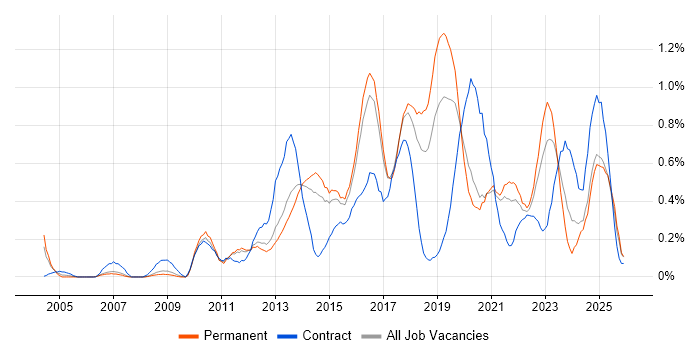Virtual Machine (VM)
West Midlands > Birmingham
The table below provides summary statistics for permanent job vacancies advertised in Birmingham requiring Virtual Machines skills. It includes a benchmarking guide to the annual salaries offered in vacancies that cited Virtual Machines over the 6 months leading up to 1 June 2025, comparing them to the same period in the previous two years.
| 6 months to 1 Jun 2025 |
Same period 2024 | Same period 2023 | |
|---|---|---|---|
| Rank | 102 | 146 | 96 |
| Rank change year-on-year | +44 | -50 | +82 |
| Permanent jobs citing Virtual Machines | 9 | 2 | 38 |
| As % of all permanent jobs advertised in Birmingham | 0.66% | 0.067% | 2.10% |
| As % of the System Software category | 5.63% | 0.79% | 15.77% |
| Number of salaries quoted | 4 | 2 | 13 |
| 10th Percentile | - | £53,875 | £67,750 |
| 25th Percentile | £44,000 | £54,063 | £68,750 |
| Median annual salary (50th Percentile) | £46,000 | £56,250 | £75,000 |
| Median % change year-on-year | -18.22% | -25.00% | +62.16% |
| 75th Percentile | £48,000 | £59,688 | £77,500 |
| 90th Percentile | - | £60,625 | - |
| West Midlands median annual salary | £46,000 | £48,750 | £53,250 |
| % change year-on-year | -5.64% | -8.45% | +15.76% |
All System Software Skills
Birmingham
Virtual Machines falls under the System Software category. For comparison with the information above, the following table provides summary statistics for all permanent job vacancies requiring system software skills in Birmingham.
| Permanent vacancies with a requirement for system software skills | 160 | 254 | 241 |
| As % of all permanent jobs advertised in Birmingham | 11.77% | 8.54% | 13.30% |
| Number of salaries quoted | 110 | 218 | 188 |
| 10th Percentile | £28,500 | £26,750 | £27,000 |
| 25th Percentile | £39,000 | £32,000 | £32,375 |
| Median annual salary (50th Percentile) | £50,000 | £45,750 | £55,000 |
| Median % change year-on-year | +9.29% | -16.82% | - |
| 75th Percentile | £68,750 | £60,000 | £72,500 |
| 90th Percentile | £73,750 | £84,919 | £81,250 |
| West Midlands median annual salary | £47,500 | £45,000 | £45,000 |
| % change year-on-year | +5.56% | - | -3.23% |
Virtual Machines
Job Vacancy Trend in Birmingham
Job postings citing Virtual Machines as a proportion of all IT jobs advertised in Birmingham.

Virtual Machines
Salary Trend in Birmingham
3-month moving average salary quoted in jobs citing Virtual Machines in Birmingham.
Virtual Machines
Co-occurring Skills and Capabilities in Birmingham by Category
The follow tables expand on the table above by listing co-occurrences grouped by category. The same employment type, locality and period is covered with up to 20 co-occurrences shown in each of the following categories:
|
|
|||||||||||||||||||||||||||||||||||||||||||||||||||||||||||||||||||||||||||||||||
|
|
|||||||||||||||||||||||||||||||||||||||||||||||||||||||||||||||||||||||||||||||||
|
|
|||||||||||||||||||||||||||||||||||||||||||||||||||||||||||||||||||||||||||||||||
|
|
|||||||||||||||||||||||||||||||||||||||||||||||||||||||||||||||||||||||||||||||||
|
|
|||||||||||||||||||||||||||||||||||||||||||||||||||||||||||||||||||||||||||||||||
|
|
|||||||||||||||||||||||||||||||||||||||||||||||||||||||||||||||||||||||||||||||||
|
|
|||||||||||||||||||||||||||||||||||||||||||||||||||||||||||||||||||||||||||||||||
|
||||||||||||||||||||||||||||||||||||||||||||||||||||||||||||||||||||||||||||||||||
